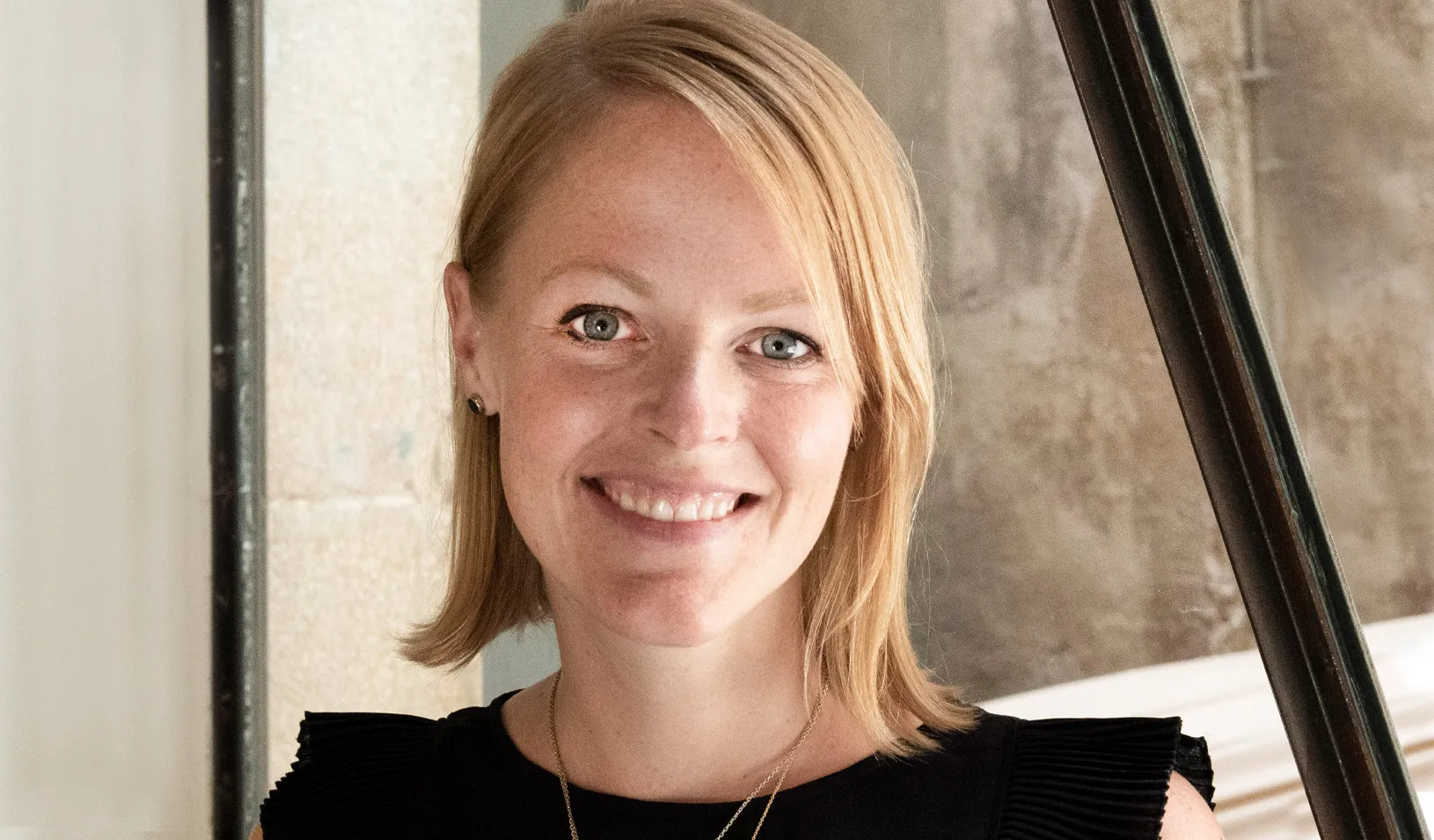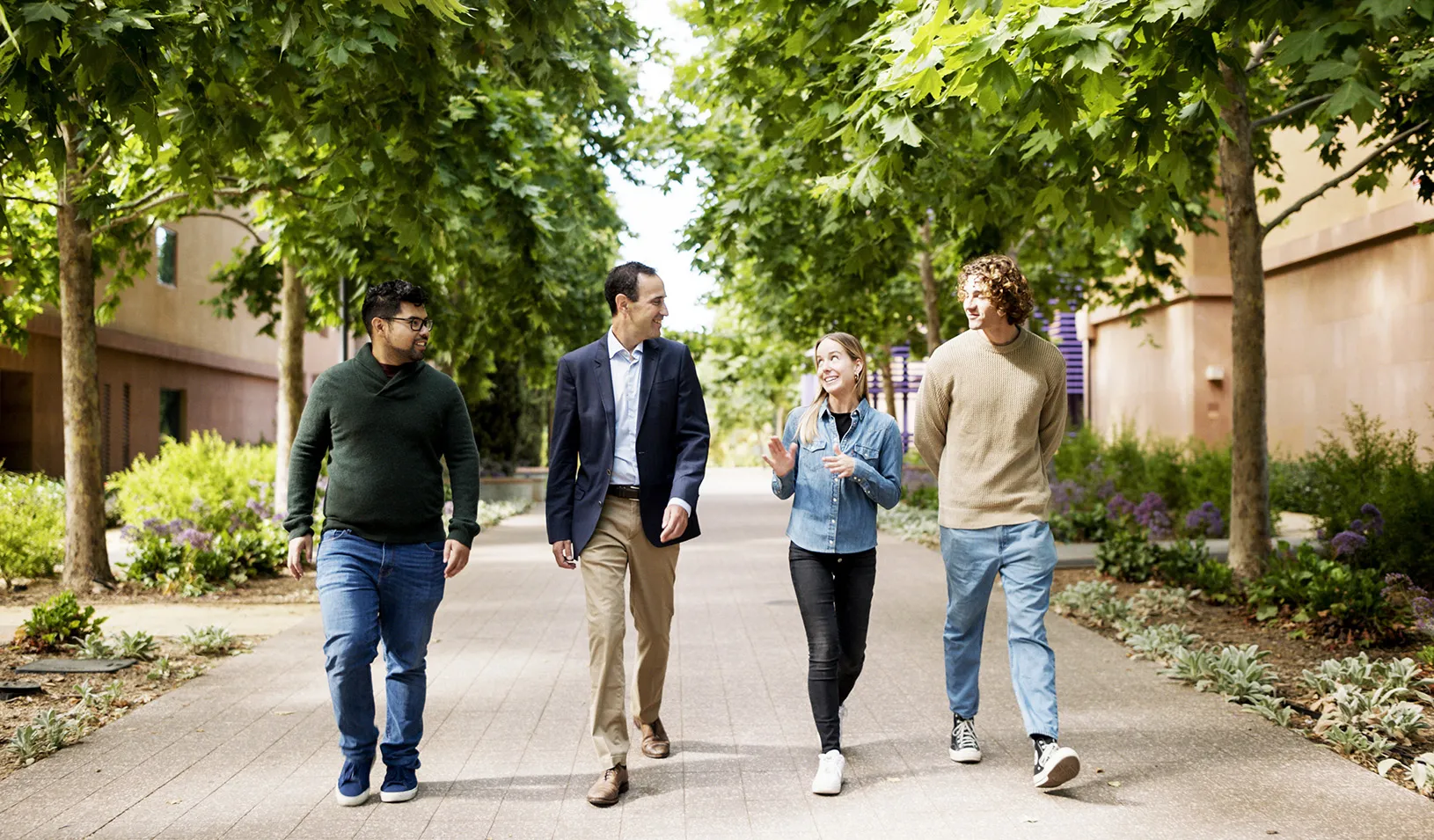Stanford Ignite Celebrates 10 Years
About 125 past participants of Stanford Ignite lit up the Stanford GSB campus at Alumni Weekend.
December 20, 2016

Nicholas Karnaze (left), shares thoughts on entrepreneurship during the panel presentation with other Igniters, Ksenia Starikova, Christoph Kohstall, Gbemisola Ogunyomi, and Pavan Boob. Facilitated by Stanford Ignite faculty director Yossi Feinberg (far right). | Rachel Bleckman
Stanford Ignite grew out of a new kind of entrepreneurial educational program initiated in 2006. It expanded from that initial on-campus program to Bangalore, India; Beijing, China; Santiago, Chile; São Paulo, Brazil; London; Paris; and New York.

A certificate program offering highly immersive instruction and guidance in core business skills, Stanford Ignite is aimed at innovators with non-business backgrounds, some of whom have already launched their own businesses. Offered on a part-time basis, the 7-week course covers topics ranging from core business skills such as accounting, finance, intellectual property, legal issues, and marketing, to “functional” skills such as communications, design thinking, leadership, and teamwork. In addition to the international locations, Stanford Ignite offers on-campus options, including nine-week part-time and four-week full-time courses, as well as a special program geared to U.S. military veterans of post-9/11 conflicts.
In aggregate, about 1,600 past participants have started more than 100 successful companies since the program was introduced.
Some of those who took advantage of Stanford Ignite to launch their entrepreneurial careers shared their experiences with an audience of fellow “Igniters” Oct. 14 at the Knight Management Center, home of Stanford GSB. The panel discussion was hosted by Yossi Feinberg, faculty director of Stanford Ignite and John G. McCoy-Banc One Corporation Professor of Economics and Senior Associate Dean for Academic Affairs at Stanford GSB. He said the program seeks “people with star quality and passion, the best in their fields.”
The executive director of Global Innovation Programs, which oversees Stanford Ignite, greeted five panelists and an enthusiastic audience.
“We’ve gone from a single program in 2006 to eight programs today,” the executive director said. “I have been humbled to represent all of you. We have people who have come here from China, India, Brazil, Chile, and the United Kingdom.”
He recognized a “big contingent from New York City” brought a boisterous cheer from the East Coast visitors.
One of the five panelists hailing from the East Coast was non-New Yorker, Nicholas Karnaze of Washington, D.C. A former Marine, Karnaze completed the Post-9/11 Veterans program in 2015 before launching Stubble & ‘Stache, which sells beard and facial-care products online and in stores.
Karnaze grew his sizeable beard as a tribute to U.S. Marine Sgt. Justin Hansen, a fellow member of elite special operations killed during combat in Afghanistan in 2012. Hansen had grown a full beard during that tour of duty. The business was an idea Karnaze developed after finding it difficult to find effective beard-care products to deal with itchiness and dryness.
“Everything we discussed [during the Stanford Ignite course] turned out to be useful for me,” Karnaze said. “I learned the value of segmenting your business. It turns out most of my customers are women buying beard-care products for the men in their lives.”
Karnaze said he received a “10,000-mile high view” of the business world and how his own aspirations fit in, as well as valuable lessons on effective marketing.
As a solo business owner, Karnaze said he appreciates the support and camaraderie he gets from his fellow Igniters.
“It’s great to be able to fall back on this network,” he said.
Karnaze isn’t the only Igniter with an eclectic background. Fellow panelist Gbemisola Ogunyomi, who completed the program in 2015, is a Nigerian petroleum industry engineer with an interest in beauty products and entrepreneurism. After attending college in the United States, Ogunyomi returned to Africa to pursue her science career. She also launched The Lady Hub, an online service that connects women of color in West Africa with beauty and fashion professionals in their communities. She said Stanford Ignite, in which she enrolled after starting her company, has helped her cope with the “lonely journey” of starting a new company, including coping with unreliable infrastructure and becoming a well-organized leader for her employees.
“As CEO, you need to stay ahead of your team and need to have a plan in case of a crisis,” she said.
Ogunyomi said she left her Stanford Ignite experience “very motivated” to succeed — as well as more confident of her abilities.
“When you are dealing with VCs, they will take your company away from you if you don’t know what you’re doing,” she said of venture capitalists.
Also touting her Stanford Ignite experience was Ksenia Starikova, who completed the program in London. She is the head of Growth and Innovation at Group XP, a New York-based consulting firm. She works with clients on devising new ways for their companies to remain competitive by planning for inevitable change.
“This program provided a very holistic way of thinking about issues,” Starikova said. “It helped me in dealing with management and financial matters.”
Like their on-campus counterpart, remote classes are taught by the same world-class faculty who teach in Stanford’s MBA Program. Use of high-definition, two-way video technology has helped expand the program to international innovation centers, Feinberg said.
“We would not have the global reach we have today without having made that investment,” he said.
The need for Stanford Ignite, unique among American universities, is greater then ever, Feinberg said.
“The world of startup ventures has evolved in the 10 years since we started the program,” he said. “There is more awareness of entrepreneurship as a career path. We have seen demand for the Ignite program rise and the quality of our participants rise.”
For the immediate future, Feinberg said the focus will be on operating Stanford Ignite programs more efficiently in 2017, with no expansion planned next year.
“From ventures improving outcomes for people with eating disorders employing the latest mobile technologies to a massively popular app teaching English to millions of people in China, we are incredibly proud of the impact that Igniters are having throughout the world,” Feinberg said.
— By David Goll
For media inquiries, visit the Newsroom.
Explore More
Erin Nixon Joins Stanford GSB as Assistant Dean of Admissions

Nia Rose Froome, MBA ’23: Making Local, Fresh Food Available for All

New Research Fund Promotes Responsible Leadership for the Next Century
